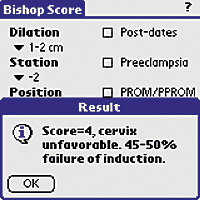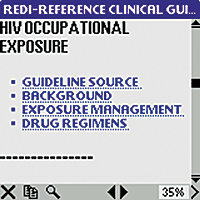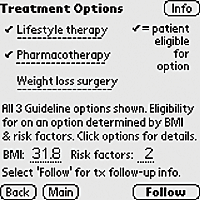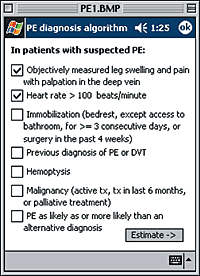
Personal digital assistants are the perfect solution for bringing evidence-based medicine to the point of care.
Fam Pract Manag. 2003;10(5):73-74
We all are aware of the importance of evidence-based clinical decision making. However, many of us find it difficult to apply in practice. The quick pace of the clinic and the expectation to see more patients per day make it impractical to leave the exam room to reference textbooks or search the Internet. When clinical questions arise, who has time to sort through myriad references and papers to look for evidence-based answers?
Personal digital assistants (PDAs) bridge the gap that makes quality information seem inaccessible by literally putting an evidence-based reference tool in your pocket. Download software from the Internet and you’ll have clinical guidelines, evidenced-based disease-management tools and the latest information from peer-reviewed journals at your fingertips. Best of all, the software creators have done all the hard work for you. They have already searched the literature and compiled the most authoritative information into concise references, cutting your search time considerably. Here are what I consider to be some of the best evidence-based-medicine tools currently available:
Journal abstracts
Redi-Reference Biweekly Clinical Update (www.redi-reference.com/beweek.htm). This biweekly clinical newsletter provides concise reviews of primary-care-related articles published during the preceding weeks by major journals. It is available for the Palm operating system (OS) only and costs $49.95 for an annual subscription, including the RediReader document reader. The reader requires 80KB of memory and the update requires 110KB.
JournalToGo (www.journaltogo.com). This service delivers the latest clinical abstracts from the National Library of Medicine and health care news from Reuters to your desktop computer for synchronizing to your PDA. Information received can be customized to your interests. Both Palm and Pocket PC versions are available, and the service is free.
Clinical prediction rules
MedRules (http://pbrain.hypermart.net/medrules.html). This tool was developed by a family physician and features useful clinical prediction rules taken from the medical literature. The program includes numerous rules, each with its own form and calculation. Rules include Bishop Score (see figure 1), the Ottawa Rules for ankle injury and Ranson’s Criteria. The program runs on the Palm OS only, requires approximately 343 KB of memory and is free.

Clinical guidelines and disease management
Redi-Reference Clinical Guidelines (www.redi-reference.com/guid.htm). This reference (see figure 2) summarizes many of the most commonly used clinical guidelines relevant to family practice, including the Harmonized Childhood Immunization Schedule, the American Heart Association Guidelines on the treatment of atrial fibrillation and the National Institutes of Health guidelines on the treatment of hypertension (i.e., The Sixth Report of the Joint National Committee on Prevention, Detection, Evaluation, and Treatment of High Blood Pressure). Palm and Pocket PC versions are available. The program requires 200 KB of memory and costs $19.95.
Stat Cholesterol (www.statcoder.com/cholesterol.htm). This interactive application guides clinicians through the Adult Treatment Panel (ATP) III cholesterol guidelines. It calculates the risk of heart disease using the Framingham method and determines target LDL levels based on individual risk factors. The application runs on the Palm OS only, requires approximately 60 KB of memory and is free.
ATP III Cholesterol Management Implementation Tool (http://hin.nhlbi.nih.gov/atpiii/atp3palm.htm). This tool assists the clinician in implementing the ATP III cholesterol guidelines. Information includes ATP III classification of lipid levels, risk assessment for coronary heart disease and drug therapy for lowering lipid levels. The application is available for the Palm OS only but may not work on Palm OS 5 until the updated application is available. It requires 123 KB of memory and is free.

OEI Treatment Guidelines Implementation Tool (http://hin.nhlbi.nih.gov/obgdpalm.htm). This interactive tool escorts users through the National Heart, Lung and Blood Institute Obesity Education Initiative’s guidelines to stratify risk and determine patients’ treatment needs (see figure 3). It includes calculators for body mass index and cardiovascular disease risk factors. The tool is available for the Palm OS only but may not work on Palm OS 5 until the updated application is available. It requires 103 KB of memory and is free.

NHLBI/NAEPP Guidelines for the Diagnosis and Management of Asthma (http://hin.nhlbi.nih.gov/as_palm.htm). This succinct reference helps the clinician manage asthma according to National Asthma Education and Prevention Program guidelines. It includes information on diagnosis and assessment, controlling contributing factors, treatment of exacerbations, medication dosages and patient education. The reference is available for the Palm OS only, requires 51 KB of memory and is free.
COPD Guidelines Tool (http://hin.nhlbi.nih.gov/copd.htm). This practical reference to the Pocket Guide to COPD Diagnosis, Management and Prevention contains guidelines for COPD management, including assessing and monitoring COPD, reducing risk factors and managing both stable COPD and acute exacerbations. The reference is available for the Palm OS only, requires 105 KB of memory and is free.
Comprehensive EBM tools
InfoRetriever (www.infopoems.com). This tool (see figure 4) allows users to search a complete POEMs database, six evidence-based databases (including Cochrane), practice guideline summaries, decision rules and predictive calculators. The Five-Minute Clinical Consult is also included. This is perhaps the most comprehensive hand-held tool for referencing evidence-based medical information. Palm OS and Pocket PC versions are available at a cost of $249 for an annual subscription; a free 30-day trial is also available.

Because both versions use quite a bit of memory (28 MB and 34 MB, respectively), an external storage card of 64 MB or higher is recommended.
Access at the point of care
There’s a lot more evidence-based medical information for the PDA than what I’ve listed here, especially for the Palm OS. Much of it is free or reasonably priced and well within reach of the average family physician. Try downloading just one application and you’ll see how easy it can be to use evidence-based medical information at the point of care.